Gymnema Sylvestre and Berberine are effective natural alternatives for obesity treatment
Nikhil Prasad Fact checked by:Thailand Medical News Team Jul 18, 2024 9 months, 4 days, 15 hours, 32 minutes ago
Weight Loss News: Researchers from various esteemed Mexican institutions have conducted a fascinating study exploring the effects of two natural products, Gymnema sylvestre (GS) and berberine (BBR), on obesity. This
Weight Loss News report delves into their findings and sheds light on how these natural substances could revolutionize the management of obesity and its related health issues.
 Gymnema Sylvestre and Berberine are effective natural alternatives for obesity treatment
Gymnema Sylvestre and Berberine are effective natural alternatives for obesity treatment
Image - Gymnema sylvestre
A Closer Look at Gymnema Sylvestre and Berberine
Gymnema sylvestre, also known as “meshashringi,” is a plant native to central and southern India. Traditionally used as a laxative, diuretic, and cough suppressant, GS is now gaining recognition for its potential in managing type 2 diabetes mellitus (T2DM) and obesity. The active compounds in Gymnema Sylvestre (GS) have been shown to regulate glucose and improve insulin sensitivity, making it a promising natural remedy for metabolic disorders.
Berberine, an alkaloid derived from plants native to China, has been used to treat various conditions, including T2DM, nonalcoholic fatty liver disease, dyslipidemia, cardiovascular diseases, and obesity. Berberine (BBR) has demonstrated significant effects in improving insulin sensitivity, stimulating glucose uptake, and reducing lipid levels. Its ability to modulate metabolic pathways makes it a valuable candidate for obesity management.
The Study and Its Methodology
The study was conducted by researchers from multiple Mexican institutions, including the Instituto Politécnico Nacional, Instituto Nacional de Pediatría, Instituto Nacional de Enfermedades Respiratorias, and Universidad del Ejército y Fuerza Aérea. Fifty adult Mexican patients with obesity were treated with either Gymnema Sylvestre (GS) or Berberine (BBR) for three months. The researchers evaluated various parameters, including body composition, blood pressure, biochemical markers, and gene expression of adipokines.
Key Findings
-Gymnema Sylvestre's Impact
GS significantly reduced fasting glucose levels and the gene expression of resistin (Res), an adipokine associated with insulin resistance. Patients treated with GS also experienced reductions in body fat percentage, glycosylated hemoglobin, and increases in basal insulin levels. These findings suggest that GS could play a crucial role in improving glucose metabolism and insulin sensitivity in obese individuals.
Gymnema Sylvestre's hypoglycemic activity primarily enhances insulin secretion in the pancreas, which lowers plasma glucose and glycosylated hemoglobin levels and raises serum insulin concentrations. Other proposed mechanisms include the inhibition of intestinal glucose absorption and increased sensitivity of peripheral insulin receptors, leading to enhanced intracellular glucose transport. Several in vitro and
human studies have shown that Gymnema Sylvestre (GS) can reduce sweet cravings, control glucose and triglycerides, and improve metabolic profiles, making it an effective supplement for managing obesity and related metabolic disorders.
Berberine's Impact
BBR demonstrated a significant decrease in body weight, body mass index (BMI), body fat percentage, visceral fat percentage, and diastolic blood pressure. Additionally, Berberine (BBR) reduced the gene expression of visfatin (Vis) and apelin (Ap) while increasing omentin (Ome). These changes indicate that BBR is highly effective in improving lipid metabolism, reducing adipogenesis, and enhancing overall metabolic health.
Berberine's mechanisms of action include improving insulin sensitivity, stimulating glucose uptake, and reducing lipid levels through the activation of AMP-activated protein kinase (AMPK) and the Toll-like receptor 4 (TLR4) signaling pathway. Berberine (BBR) also inhibits complex I of the respiratory chain, contributing to its antioxidant capability by activating the translocation of nuclear factor erythroid 2–related factor 2 (Nrf2), which increases the gene expression of superoxide dismutase (SOD), glutathione peroxidase (GPX), and reduced glutathione (GSH). These effects make Berberine (BBR) a promising agent for treating metabolic syndrome and cardiovascular risk associated with obesity.
Comparative Analysis
A comparative analysis revealed that BBR had a more substantial impact on body composition and blood pressure, as well as a more favorable effect on the gene expression of adipokines associated with metabolic risk. Gymnema Sylvestre (GS), however, excelled in reducing fasting glucose and improving parameters related to insulin resistance.
Berberine (BBR)'s greater effect on body composition and metabolic parameters can be attributed to its comprehensive mechanisms that target multiple pathways involved in obesity and metabolic health. Meanwhile, GS's impact on glucose regulation highlights its potential as a targeted treatment for improving insulin sensitivity and managing diabetes in obese individuals.
Adverse Effects
Both Gymnema Sylvestre (GS) and Berberine (BBR) were well-tolerated by patients, with minimal adverse effects. The most common side effects were gastrointestinal symptoms, which subsided within the first month of treatment. Patients treated with GS reported more gastrointestinal and somatic symptoms compared to those treated with BBR. These symptoms included dysgeusia, diarrhea, nausea, reflux, decreased consistency of stools, and polydipsia. In contrast, the Berberine (BBR)-treated group experienced fewer adverse effects, with some reports of nausea, constipation, and hemorrhoidal bleeding.
The possible adverse effects of Gymnema Sylvestre (GS) may be caused by an increase in glucose concentration in the intestinal lumen, leading to an osmotic effect and consequently diarrhea. A severe decrease in glucose may cause hypoglycemic effects such as nausea, which may lead to vomiting. Conversely, GS has adverse effects such as hypersensitivity, significant hypoglycemic effects, and drug interactions. BBR, on the other hand, generally causes mild gastrointestinal events, making it a safer option for long-term use in obesity management.
Conclusion
This groundbreaking study highlights the potential of Gymnema sylvestre and berberine as effective natural alternatives for managing obesity. Berberine proved to be more effective in improving body composition and metabolic parameters, while GS showed a significant impact on glucose metabolism. The minimal adverse effects observed in both groups further support the use of these natural products in obesity management.
The study findings were published in the peer-reviewed journal: Nutrients.
https://www.mdpi.com/2072-6643/16/14/2284
For the latest
Weight Loss News, keep on logging to Thailand Medical News
Read Also:
https://www.thailandmedical.news/news/the-fungus-sanghuangporus-vaninii-as-a-potential-natural-solution-for-obesity
https://www.thailandmedical.news/news/move-over-ozempic-and-wegovy-fermented-blackberries-the-new-anti-obesity-and-weight-loss-remedy
